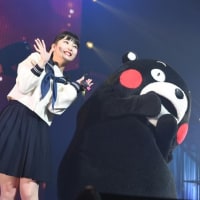
3月のTOEIC本試験(3月10日⬅東京大空襲の日、日露戦争の奉天会戦で日本が「判定勝ち」した日、松田聖子さんの誕生日、SKE48の女王というかAKB48グループの現役の女王・松井珠理奈さんの誕生日から二日後!)ももうすぐです。ということで、Part7「Multiple passages」(第176問-第200問)の教材の材料として二つの海外報道を収録しておきます。
所謂「第三者委員会」と称する「AKSの内部調査委託チーム」のレポートが出たら、それを踏まえて、今回の「NGT48山口真帆さん暴行事件」に関して、英文の批判記事をアップロードするつもりですが、この資料収録記事は、その英文記事の「脚註」の一部になると思います。
・NGT48暴行事件CNNも正面から報道
――AKSさん、「世間はいずれ忘れてくれる」は今回はないよ。
https://blog.goo.ne.jp/kabu2kaiba/e/bc10dba097b26d3e501559cad8e37e4a
・NGT48の「第三者委員会」発足についての
感想みたいなものの覚書と資料数点+追記あり
https://blog.goo.ne.jp/kabu2kaiba/e/46626ebc4c43814f5703d03c06800798
・NGT48山口真帆さん事件についてやっと「運営」が出したコメントに吃驚ポンした
https://blog.goo.ne.jp/kabu2kaiba/e/ac2a251a88fc176152c8f10aacb82379
・NGT48運営無惨・・・公式サイトで「笛吹けど」生暖かな視線⬅何が問題か教えてあげませようか?
https://blog.goo.ne.jp/kabu2kaiba/e/15af4fa9219d8ae793c520e3d99bbc92
・”NGT疑獄 山口真帆さんを守りましょう!”
⬅この問題は「山口真帆」さんだけの問題ではない❗
https://blog.goo.ne.jp/kabu2kaiba/e/c82ac3a0277d737e6176a58ab5bbacf7
尚、TOEICの「Multiple passages」対策としては、「自分が第三者委員会のメンバーだったらどんなレポートを書くだろうか」、じゃなかった、「自分がETSの問題作成者なら、①この二つの記事の各々どの部分を切り取って課題のパッセージにまとめて、②それを受けてどんな5個の質問を受験者に問うだろうか」と考えながら読んでみましょう。読解の目処は――TOEIC730点前後、よって、目標が860点の方で――6分くらいでしょうか。4分で読めれば、英語でビジネスを遂行するのに(音声面は別にして)充分な基礎体力があると自信を持ってもいい、鴨。まあ、はやく読めなくともきちんと意味がとれればよいのですけれどもね。
加之、せっかく一度でも読んだのならば、更に、この「教材」の音読もおすすめします。ちなみに、英語のネーティブスピーカーが普通に話す発声速度は、米英のPublic Speakingの研修指導業界の界隈では、毎分250~500 wordsと言われています(もっとも、この平均なるもは、実は、テクストの語彙数だけでなく総音節数とその中央値--および、日本語母語話者が苦手な音節と、音節の組み合わせの数と中央値--をも加味しなければ、そう大して役に立つ数値は得られないはずだけれど)。私自身何度も調査しましたが、これはやはり正しいです。本場の業界人、やっぱ凄い!
而して、というか、ところで、TOEICに換算して860点前後の英語力までの方--つまり、上級の下位グループに昇進したか入幕間近くらいまでの日本語の母語話者にとって--、平均毎分250 wordsの英語音声は少し速いと感じられる、鴨。英語の母語話者にとっても早口と感じられる500 words以上に至っては、雑音の中で聞く英語らしきものにしか聞こえないはず。特に、そのテクストが関心が薄い/背景知識の乏しいジャンルのものだったら、まあ、それは立派な雑音です。だから、音読も、そう制限時間に――制限時間というか持ち時間を意識することは大切なことですが――ナーバスにならず、まずは、発声してみてください。そして、継続は力。day by day, night after night, time after time, over and over again, and again and again, しかも、一語一語(word for word)丁寧に、徹頭徹尾(through and through)、そうすれば、year after year 、少しづつにせよ(inch by inch)誰でも能力開発していくもの。また、それが、1年後には――選抜常連メンバーとNGT48のビッチメンバーくらいの――大きな差になるはず。楽しんでください。

▽NGT48事件をCNNが世界に配信 日本のアイドル事情理解に限界も?
Why a pop idol's stand against her assault sparked outrage in Japan
CNN Digital Expansion 2017. Emiko Jokuza
By Emiko Jozuka and Yoko Wakatsuki, CNN
Updated 0407 GMT (1207 HKT) January 17, 2019
Tokyo, Japan (CNN)
It was a meant to be a happy occasion to launch the New Year -- a meet and greet between a Japanese pop idol and her fans. But Maho Yamaguchi didn't turn up to her pop group's event on January 6. In the following days, she apologized for her absence and went public as to the reason why: An alleged assault at the hands of two male fans.
"I am sorry to shock you guys. Some might get scared to hear what happened to me. I am really sorry. I wanted to help those who were going through the same experience," she posted on her Twitter account on January 8.
Yamaguchi is a member of Niigata-based "idol group" NGT48, a sister group to the famous 48-member girl band AKB48. She claimed a member of her group had leaked her address to two male fans who assaulted her at home on December 8 last year.
"I didn't do anything for a month because I didn't want to impose on everyone that supports me. I don't want you to dislike NGT (the pop band) ... That's because I believed they'd sort all this out," Yamaguchi added on Twitter.
Following her online confession, Yamaguchi made a fleeting appearance at her pop group's three-year anniversary show on January 10 and apologized in person for "causing trouble" to her fans.
A statement on NGT48's website last week confirmed that another member had told male fans when Yamaguchi might return home. The two men were arrested on suspicion of grabbing her face but later released. Yamaguchi insinuated her management company did nothing to deal with those involved in her ordeal.
Apology stirs controversy
Her apology comes amid growing attention in Japan to the issue of violence against women. In the days following her Twitter post, criticism was directed at Yamaguchi's management company, AKS, for its apparent mishandling of the incident -- and for her seemingly unnecessary omission of regret.
In Japan, people often issue public apologies when they think they have disturbed "wa" or societal harmony. Speaking to CNN, Kukhee Choo, a cultural studies expert at Sophia University in Tokyo, said that Yamaguchi's apology has also helped her to garner more sympathy from the Japanese public.
"There's a lot of affinity in Japan towards idol figures as the management companies choose very average, cute, young cheerful women. They want everyone to feel like this could be your daughter or next-door neighbor," said Choo.
"If someone powerful has a hard time coming out, the average women in Japan thinks, what chance do I have? But idols are very relatable. This incident could help other young women to think, if she came out, then I can come out too."
Japan is ranked 110th out of 149 countries in the World Economic Forum's index measuring the degree of gender equality. The country also ranks bottom among G7 countries for gender equality, despite Prime Minister Shinzo Abe's pledge to empower working women through a policy called "womenomics."
According to Choo, Japanese culture is still bound by notions that women have to behave in a so-called "womanly way" to elicit sympathy. "In western culture strong women are respected, but in Japan, even when you're strong you have to perform the victim."
The management company for both NGT48 and AKB48 announced Monday that it had removed one of its officials amid criticism of its handling of the alleged assault on Yamaguchi. It said it would take preventive measures such as providing emergency alarms to all members and patrol around their homes. In a statement, the company said they were "determined to build trust with each of the members and to provide mental care for Maho Yamaguchi and all other members."
When the 'girl-next-door' speaks up
The Japanese pop idol industry, or J-pop as it's more commonly known, is worth billions of dollars. Major record companies maintain a tight grip on the lives of their stars, dictating their image and behavior both on and off stage.
Many of the groups are manufactured to appeal to male demographics.
"The point is they have to be cute and sexy and push all the buttons of the deferential and pure girl that appeals to guys," said Jeff Kingston, professor at Temple University in Tokyo and an author of several books on Japan and Japanese social change.
Post-concert meet and greets and photo opportunities are routinely used to foster a sense of closeness between J-pop performers and audiences. It's here that the performers continue to sell their fabricated identities. But it's this faux sense of intimacy that blurs the line between fantasy and reality for some fans. In 2014, a saw-wielding man attacked two members of AKB48, and in 2017, an obsessed fan turned stalker stabbed pop idol Mayu Tomita dozens of times.
The failure of the record industry to better protect its stars from violence has been amplified in the age of social media.
A petition on change.org that supported Yamaguchi and called for the manager's resignation had garnered more than 53,000 signatures when it closed on January 13.
"The (record company) staff should first protect the girls," Kemta Otsubo, an idol industry insider and writer, told CNN.
"It was inevitable that criticism would occur worldwide (in Yamaguchi's case), everybody is very angry with the management angry for apologizing for failing to protect her after Yamaguchi herself apologized."
CNN's Euan Mckirdy contributed to this report.

▽日本のアイドルは危険と隣り合わせが常態の状態
Inside the Weird, Dangerous World of Japan’s Girl ‘Idols’
In Japan’s “Idol” Industry cute young girls often are used and abused.
One victim spoke out—then apologized.
Mari Yamamoto,
Jake Adelstein
01.21.19 12:18 AM ET
TOKYO—The marketing of pop stars (male and female) is a huge business in Japan, generating billions of yen in revenue for the management. It’s sometimes a dirty business as well, with the young idols being used and abused until their “expiration date” has passed or they “graduate.”
Every now and then something brings to light the dark side of the industry; tongues are clicked, bows are made, and things go back to being the way they were.
But when an assault on a member of the popular idol group, NGT48, came to light this year, and the victim then apologized “for creating a commotion,” a storm of outrage blew up—and new revelations surfaced like bombshells washing in with the tide.
As a result, the controversy may finally hit managers in a place that makes them reconsider the way they conduct business: in the pocketbook.
What Are Idols?
The word “idol” doesn’t have negative connotations in Japan; there are no “false idols,” only profitable ones or unprofitable ones. “Idols” or aidoru refers mostly to the young women and girls who sing, dance, and act for their adoring fans, most of whom are male.
They project an image of purity and friendliness and are touted as role models for many kids. AKB48, the biggest idol group, oddly enough does photo-shoots printed in Japan’s pornographic Weekly Playboy magazine (no relation to the U.S. Playboy) and also had a corner in a newspaper for children.
Idols face tremendous pressure to please their fans and make money for the management. Many sacrifice their adolescence in the process.
Last March, one young idol, aged 16, killed herself. Her parents sued the management company for damages; they also demanded clarification of the events leading up to her death. The case is still pending and a major witness is expected to take the stand on Feb. 18 this year, according to her lawyers.
The latest victim exposing abuse was 23-year-old Maho Yamaguchi. She was in the group NGT48, founded in 2015 in Niigata Prefecture where it has helped bring attention to Niigata and promote tourism. It’s a 48-girl ensemble, and a sister group of AKB48, Japan’s best-known idol group.
On Dec. 8, two 25-year-old men attacked Yamaguchi in front of her home, grabbing her by the face and roughing her up. The Niigata Prefectural Police came to the scene and arrested the two men on assault charges. The men claimed that they were just eager fans and although the police filed charges, the Niigata prosecutor’s office decided on Dec. 28 not to indict. The two men were let go.
The case was not reported in the news; the Niigata police made no announcement.
Yamaguchi, apparently frustrated with the cover-up and the lack of protection from her own management, a firm known as AKS, publicly uploaded a video on social media on Jan. 8 tearfully explaining what had happened.
She said, “I can’t remain silent because this might happen to other members... I’d like to tell the whole truth but I can’t. They [the managers] said they’d get rid of the bad members but they don’t. I can’t bear to think of other members having the same terrifying experience, at least I was lucky this time and was saved [by someone].”
On her Twitter account, she went into further detail, although most of the tweets later were taken down.
Not only did Yamaguchi reveal that she had been assaulted, she implied that another member of her own group was involved in the attack. The management later admitted that one of her co-workers had revealed to the attackers her personal details including what time she usually came home.
It’s not clear who, if anyone, urged the men to attack her, although former idols suggest that rivalry among the girls is so fierce that it wouldn’t be out of the question for one girl to orchestrate an attack on another.
In this case what was was revolutionary was an idol coming forward to tell her story—and criticize the management while doing it. In Japan’s extremely crooked entertainment world, that would usually result in banishment.
Amina Du Jean, a former idol now studying sociology in England, says, “It’s a godsend that Yamaguchi has had the courage to speak up. We’re now seeing idols from all across the board speaking out. While crazed fans aren’t the overwhelming norm, when they do overstep boundaries, idols are often told to be a neutral party to maintain their public persona. What Yamaguchi Maho and the other idols have done by coming out now is groundbreaking. You would’ve never seen this before in the old days with Onyanko Club [a mega idol group in the 1980s]. It would’ve been career suicide. Really, social media has allowed for this to happen.”
The whole story, with all the elements of mystery and cover-up, made Japan’s cybersphere explode with speculation and outrage. If you watch the video of Yamaguchi tearfully and sincerely pleading her case, it is indeed heartbreaking.
With her story out in the open, Japan’s public broadcaster, NHK, and other news outlets picked up the news, reporting on the assault and that the Niigata police had indeed arrested two young men who were not indicted.
The NGT48 management company, AKS, remained silent. Then, on Jan. 10 at a concert celebrating the anniversary of the group’s founding, Yamaguchi took the stage publicly and apologized for “causing a commotion.”
Many fans thought the apology must have been forced. They shouted encouragement for her and anger at AKS: “You’re not the one at fault! They are!”... “You don’t need to apologize!”... “Don’t give up!”
AKS posted a comment on its homepage but the controversy just keeps going. On Jan. 12, weekly magazine Bunshun published a detailed report online, including a chart explaining who was involved in the assault and hypothesizing about what really happened.
By Jan. 14, AKS held its first press conference to address the matter. Its spokespeople were not very convincing.
We reached out to AKS for comment and eventually were referred to its most recent posting on the official NGT48 website. In a press release which translates with the title, "Concerning the series of disturbances related to Maho Yamaguchi," the management apologized for “causing problems for the fans of NGT48 and making them worry.”
It responded to allegations of a team member being involved in the attack by saying that if there had been an accomplice the Niigata police would have filed charges on more than two men with the prosecutors. They did vaguely state that there might have been inappropriate words and actions by other girls.
AKS has pledged to set up an independent committee to look into the matter, clearly hoping the story will die.
On Jan. 20, the managers of NGT48 published a message directed to the mass media: “There has been much reporting that is going too far, talking to neighbors, speaking to family members, late night visits… Please restrain yourselves from overzealous coverage as this is stressing the family members, and violating privacy.”
It is also stressing out Yasushi Akimoto, the man pulling the strings of both NGT48 and AKB48.
Bitter Fruit
While the media have been pounding AKS management, very few Japanese periodicals have been willing to question the responsibility of Akimoto, the man in charge of the AKB48 group, of which NGT48 is a subsidiary. But he is the ringmaster of the idol circus.
AKB48 was founded in 2005 by Yasushi Akimoto and his partner Kotaro Shiba. Shiba, according to police sources and reports by weekly magazines in Japan, was an associate of the Yamaguchi-gumi Goto-gumi crime group, and a former loan shark. AKB48 management has never offered a denial. The Goto-Gumi disbanded in 2008. AKB48 continues.
Some of the group’s business practices are reminiscent of the yakuza, who are adept at milking people out of their money by any means possible.
From the start, the group has been a massive money-making machine, and the prototype for other groups. AKB48 has 48 members ranging from 12 to 26 years of age. They perform daily at the AKB48 stadium in Japan’s otaku mecca, Akihabara, and generate millions of dollars for their production company. (Otaku is a broad term used to refer to avid fans of Japanese anime, idols, cosplay, and manga.)
According to labor rights activist and author Shohei Sakagura, little of that revenue reaches the girls working for the firm, and upon “graduating” (getting too old to be an idol) many of them have few job skills, having wasted their best academic years in a low-paid job. Some of the girls have drifted into pornography and other less savory professions.
In order to foster the fantasies of the male fans, the girls are forbidden to have boyfriends, lovers or any kind of sexual relations. This encourages the idea of virtual love: gijiai.
Idols who are caught falling in love have had their heads shaved and made public apologies. Idols have been sued by their managers for daring to have loved someone. The problem is so bad that even a Japanese judge once reprimanded a managing firm, ruling that, “forcing a woman to abstain from loving someone as part of a contract is a violation of basic human rights” and rejected their lawsuit.
While the girls can’t have boyfriends, they can have contact with their admirers, at a distance.
The girls often have “handshaking events” with their fans, in which the sweaty young and old males who idolize these girls get to touch their idols— for a price of course.
In May 2014, a mentally ill man with a folding-saw injured two young AKB48 girls and a staff member at one of these events. The events were stopped for roughly three months before reopening.
The day before the official announcement that the handshaking (and money-making) would start again, Akimoto did an interview with the Yomiuri Shimbun in which he proclaimed, “These girls who have been injured have decided to stand up and go forward,” framing the decision as a courageous act.
The Yomiuri Shimbun and many other companies have been happy to avail themselves of the marketing power of AKB48. The group is a big draw and manages to sell millions of CDs–(yes, CDs!)–every year when they release a new song.
That’s because with each copy of the CD is a ballot to vote in the AKB48 general elections. The number of votes are used to rank the popularity of the group’s many vocalists and dancers. The higher an idol’s rank, the more prominently her singing and dancing is supposed to be showcased in AKB48 performances and future songs. Fans can vote for their favorite AKB48, SKE48, NMB48 or HKT48 members multiple times. They have to buy a CD for each vote.
The group’s newest song, “Teacher, Teacher,” went double platinum, with over 2.5 million CDs sold in two days.
Most of the CDs ended up being tossed in the garbage.
AKB48 members are usually tossed in the garbage only after they become too old, too independent, or too troublesome.
It seems that the outspoken Yamaguchi is headed for the trash heap already. Before the concert on Jan. 10, AKS management contacted reporters at tabloid newspapers and suggested that Yamaguchi was mentally ill, hoping to discredit her in advance.
The Backlash
In this most recent scandal, it’s not only the fans that are angry about the way Yamaguchi has been treated; so is the general public. Even companies are starting to notice. One in Niigata Prefecture, Ichimasa, which is famous for its kamaboko (processed seafood) products, had been using NGT48 in its commercials. After the scandal broke, the company announced that it would be pulling the ads for the time being, and its stock price shot up 46 yen. The media reported that Ichimasa had gained public favor for reacting to the crisis faster than NGT48 management.
The Niigata Chamber of Commerce took out of public domain a video that had featured NGT48. Other local businesses that have been using NGT48 in promotions also are reconsidering their use of the group.
In press conferences, the media has even been questioning why the Niigata prosecutors dropped the charges. The Niigata police made the arrests and investigated the case, but the prosecutors let the alleged assailants go free. People wonder why.
Of course, in Japan, many cases of non-sexual assault against women are not indicted. In cases involving sexual assault, only one out of five women even go to the police, knowing that the odds there will be a serious investigation are slim, and the odds of an actual indictment 50 percent or less.




















